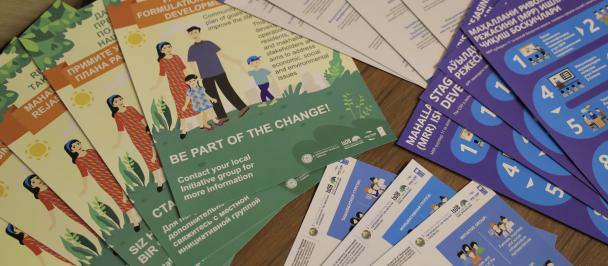The Coca-Cola Foundation and UNDP improving residents' knowledge about safe water in the Khilol makhalla, Khorezm region
November 25, 2022
Within the framework of the Joint Program of UNDP, UNFPA and FAO “Unleashing young people’s and vulnerable citizens’ creativity and innovation by strengthening their adaptive capacity to address the economic and food insecurities in the exposed communities of the Aral Sea region " on November 24, 2022 under the project "Improving health care in the Aral Sea region by providing access to safe drinking water in rural areas", funded by The Coca-Cola Foundation, a training was conducted to increase the knowledge and skills of rational use of safe water and compliance with sanitation and hygiene standards "Water, sanitation and hygiene" (WASH) in the community of "Khilol", Urgench district, Khorezm region.
The training was held in the building of the Vocational College No. 26 of the Urgench district, which is located on the territory of the Hilol community. Residents of the settlement "Hilol", representatives of the administration of the rural gathering of citizens "Hilol", a vocational college, a secondary educational school, as well as representatives of the UNDP were participated at the training (40 people in total).
Purpose of the training:
- To provide knowledge and skills of rational use of safe water and compliance with sanitation and hygiene standards, including proper hand washing
- Familiarization with information about sanitation and hygiene, about existing national and international legislation
- To orient the population on compliance with sanitary and hygienic standards in households and in public places
During the training, the UNDP team covered the following areas:
- Sanitation and hygiene: Existing legislation on sanitary norms, rules and hygienic standards; Definition of sanitation and hygiene.
- Application of hygiene in practice. Hand washing: How children and adults can get sick; Water-borne diseases and the disease transmission cycle, the importance of water balance in the treatment of infectious diseases, in particular COVID-19; Creating sustainable barriers to stop disease transmission; Safe drinking water and the value of water
- Types of diseases transmitted through low-quality water and the cycle of disease transmission; Classification of diseases transmitted through water; Transmission routes and prevention.
Also during the training, a discussion in the form of questions and answers was held with the team of the Joint Program.
For information: If you remember, construction and installation work was started in August 2022, with the aim of providing more than 3,000 residents (including about 1,600 women) with clean drinking water.
Currently, construction and installation work has been completed; the testing stage of water supply networks is in progress.

 Locations
Locations



